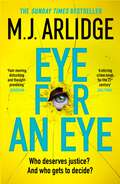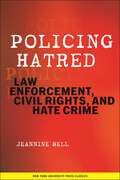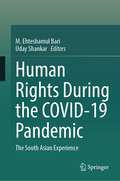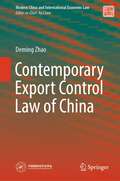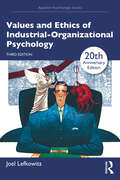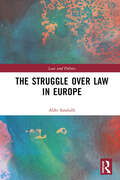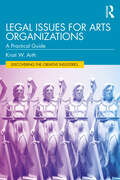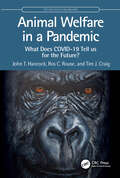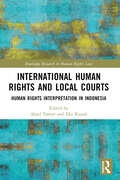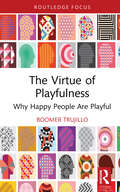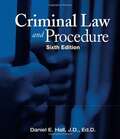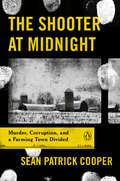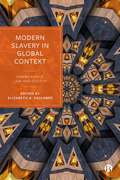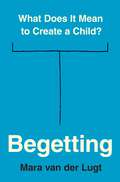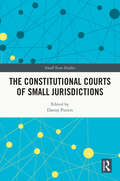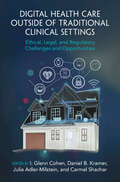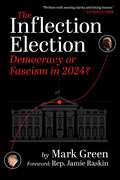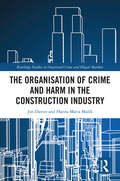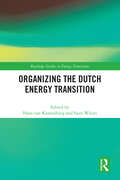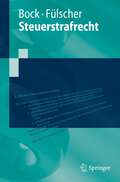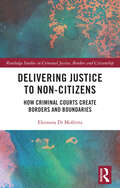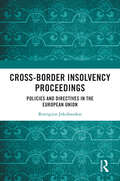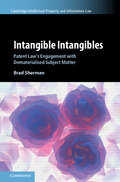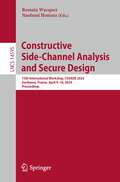- Table View
- List View
Eye for An Eye: The Richard & Judy Winter 2024 Book Club thriller that will get everyone talking
by M. J. ArlidgeOUR MOST NOTORIOUS CRIMINALS HAVE HIDDEN IN PLAIN SIGHT.UNTIL NOW...'Emily' is a devoted single mother.'Jack' starts a new job in a new town.They both share the same secret: neither of them are who they say they are.They are among only nine criminals in the UK who have been granted lifelong anonymity, for their own safety, because of their terrible crimes. But what if someone exposed their true identities to the families of their victims, who are desperate for revenge? Probation officer Olivia Campbell is caught in the crossfire of this crisis - and as the search for the mole behind it all intensifies, so too does the hunt for the vigilante killers let loose by the leaks...RIGHT OR WRONG?CRIMINAL OR VICTIM? REDEMPTION OR REVENGE?*****Praise for AN EYE FOR AN EYE: 'A big, bold, twisting thriller' CHRIS WHITAKER 'A thought-provoking masterclass' DANIEL COLE'A propulsive thriller ... Fast-moving, disturbing and thought-provoking' GUARDIAN, Thrillers of the Month 'A stirring crime novel for the 21st century' DAILY MAIL 'There are no easy answers in this thoughtful, harrowing thriller' THE SUN 'Impressive and compassionate, Eye For An Eye should win prizes' LITERARY REVIEW #EyeForAnEye
Policing Hatred: Law Enforcement, Civil Rights, and Hate Crime (Critical America #15)
by Jeannine BellExplores the intersection of race and law enforcement in the controversial area of hate crimeHigh-profile hate crimes like the torture-murder of Matthew Shepard and the dragging death of James Byrd have drawn the nation’s attention, but there are thousands of other individuals who are attacked because of their race, religion, or sexual orientation each year. This study of hate crimes challenges common assumptions regarding perpetrators and victims: most of the accused tend to be white, while most of their victims are not.Policing Hatred is an in-depth ethnographic study of how hate crime law works in practice, from the perspective of those enforcing it. It examines the ways in which the police handle bias crimes, and the social impact of those efforts. Bell exposes the power that law enforcement personnel have to influence the social environment by showing how they determine whether an incident will be charged as a bias crime.Drawing on her unprecedented access to a police hate crime unit, Bell’s work brings to life the stories of female, Black, Latino, and Asian American detectives, in addition to those of their white male counterparts. Policing Hatred also explores the impact of victim’s identity on each officers handling of bias crimes and addresses how the police treat defendants’ First Amendment rights. Bell’s vivid evidence from the field argues persuasively for the need to have the police diligently address even low-level offenses, such as vandalism, given their devastating cumulative effects on society.
Human Rights During the COVID-19 Pandemic: The South Asian Experience
by M. Ehteshamul Bari Uday ShankarThis book sheds light on the fact that the proclamation of an emergency can be a legitimate constitutional method to take prompt preventative measures in protecting the interests of the society in times of grave crises. However, the exercise of emergency powers should not undermine a nation’s commitment to democratic values, such as maintaining the rule of law and upholding fundamental human rights. The COVID-19 pandemic has posed grave threats to the lives and health of individuals. However, since the constitutions of South Asian nations do not permit the proclamation of an emergency on health grounds, executives of these nations were constrained to rely, among other things, on ordinary legislation to tide over the threats posed by the pandemic. Although these statutes entrust the executive with extensive emergency powers, they do not simultaneously stipulate any safeguards subjecting the exercise of such powers to a reliable system of checks and balances. Accordingly, this book critically examines the exercise of emergency powers in the South Asian nations to tide over threats posed by the COVID-19 pandemic, which had a profoundly adverse impact on the human rights of individuals. Such exercise of powers was consistent with the general tendency demonstrated by succeeding generations of the executives in these nations to use emergency situations as the convenient means for imposing long-lasting limitations on the rights of individuals. Consequently, this book identifies the flaws, deficiencies, and lacunae of the legal framework in these nations, which permit the executive to assume unfettered power in the exercise of emergency measures at the expense of the liberty of individuals. Consequently, based on these findings, recommendations will be put forward for initiating reforms in these nations aimed at ensuring the maintenance of a delicate balance between the necessity to respond tograve threats and to simultaneously prevent undue intrusion on the fundamental human rights of individuals.
Contemporary Export Control Law of China (Modern China and International Economic Law)
by Deming ZhaoThis book gives practical and in-depth presentation and analysis of the issues under China export control law and economic sanctions regime. This book not only addresses issues faced by the legal entities in China, but also attends to the concerns about Chinese extra-territorial jurisdiction of China export control law and sanctions legislations, on the part of foreign companies. Finally, the author shares his experiences on how to structure export control and sanctions compliance under Chinese law on the part of both Chinese and foreign companies.
Values and Ethics of Industrial-Organizational Psychology (Applied Psychology Series)
by Joel LefkowitzThis foundational text was one of the first books to integrate work from moral philosophy, developmental/moral psychology, applied psychology, political and social economy, and political science, as well as business scholarship. Twenty years on, this third edition utilizes ideas from the first two to provide readers with a practical model for ethical decision making and includes examples from I-O research and practice, as well as current business events. The book incorporates diverse perspectives into a "framework for taking moral action" based on learning points from each chapter. Examples and references have been updated throughout, and sections on moral psychology, economic justice, the "replicability crisis," and open science have been expanded and the "radical behavioral challenge" to ethical decision-making is critiqued. In fifteen clearly structured and theory-based chapters, the author also presents a variety of ethical incidents reported by practicing I-O psychologists.This is the ideal resource for Ethics and I-O courses at the graduate and doctoral level. Academics in Organizational Behavior and Human Resource Management will also benefit from this book, as well as anyone interested in Ethics in Psychology and Business.
The Struggle over Law in Europe (ISSN)
by Aldo SandulliThis book examines the role of law in Europe at a time when economic policies have become dominant not only on this continent but globally. Can law be seen as a mere infrastructure? Or does it contribute to defining the social and legal order through its own inherent rules? If the second hypothesis is true, what might these rules be, and how may they be identified? Lastly, to what extent can agreeing a definition of the role of law affect the future of Europe? With the Next Generation European Union, the EU has introduced an unprecedented investment plan for economic recovery and resilience. In doing so, it has become the most important financial intermediary on the continent. But is this simply the prelude to a European economic and financial revival, or does it also aim to strengthen the European legal order in social, political, and constitutional terms? This book argues that the role of law in Europe should be to achieve a balanced relationship between freedom and solidarity; encouraging economic competition, but also social cohesion. Analyzing the role of law in the project of European integration, it maintains that law should be more than an infrastructure for finance and economics, showing how it can act as a guide and a binding force to achieve a more balanced relationship between economics, politics, and law. This book will be of interest to scholars in the fields of public law, European law, law and economics, the philosophy of law, legal history, political theory, and political science, as well as others concerned with the future of European integration.
Legal Issues for Arts Organizations: A Practical Guide (Discovering the Creative Industries)
by Kristi W. ArthLegal issues touch every aspect of organizations in the creative and cultural sectors. This book teaches non-lawyer, arts administration professionals and students how to identify and manage legal issues common to arts organizations.Legal Issues for Arts Organizations demystifies common legal problems and helps readers to approach them proactively. With an easy-to-remember “issue-spotting” process, the book helps develop the average administrator’s “eye” for legal issues, so that the administrator knows when to do more research and when to seek out professional legal assistance. Written by a law professor and former intellectual property litigator with experience in arts policy and administration, this book provides a framework that arts professionals can use to navigate legal issues with increased confidence. It provides an overview of the American legal system, teaches a systematic process for identifying legal issues, trains administrators to read and understand contracts, gives practical advice for working with professional lawyers, and puts theory into practice with an applied learning component.Packed with practical tips and advice, this book provides a primer that every arts administrator and every arts- and nonprofit-management student will find immediately useful.A book adoption gift containing teaching support materials is available to instructors. To gain access, visit www.routledge.com/9780367771133.
Animal Welfare in a Pandemic: What Does COVID-19 Tell us for the Future? (CRC One Health One Welfare)
by John T. Hancock Ros C. Rouse Tim J. CraigAnimal Welfare in a Pandemic explores the impact of COVID-19 on a wide array of animals, from those in the wild to companion and captive animals. During the height of the pandemic, a range of animals were infected, and many died, but this was hard to predict, even using up-to-date bioinformatics. Lockdowns around the world had, and continue to have, a major effect on animals’ welfare, influencing pet ownership and care, as well as impacting on the work of conservation institutes due to the lack of visitors and funding and lack of tourist presence in the wild which impacted on anti-poaching efforts. Some of the vast amount of personal protection equipment (PPE) that was distributed was discarded, creating both dangers and occasional opportunities for wild animals. With the rollout of human vaccines, some countries started developing animal vaccines, only some of which were deployed. In summary, the pandemic had a wide-ranging influence on animal welfare around the world. This is reviewed to highlight what can be learned to protect and enhance animal welfare in future epidemics/pandemics, and contribute to a genuinely One Health approach where the health and welfare of both humans and animals are considered holistically.This book is authored by members of the University of the West of England, Bristol, who span a range of expertise in Biological Sciences, Social Sciences, Animal Welfare, and Ethics.
International Human Rights and Local Courts: Human Rights Interpretation in Indonesia (Routledge Research in Human Rights Law)
by Aksel Tømte Eko RiyadiThis book addresses the technicalities of how international human rights law can be applied at the domestic level through a case study of the human rights methodology of the Indonesian judiciary. Numerous international human rights treaties have been ratified by States parties all around the world. However, local implementation has proven a difficult task for national authorities with every State struggling to realize rights to varying degrees. This reveals a gap between the standards of human rights as envisaged by the law and those experienced by rights holders at the local level. This work analyses how Indonesian courts interpret and apply human rights. It discusses the position of human rights within specific areas of Indonesian law: constitutional law, criminal law and private law. It analyses how courts have dealt with specific cases within these fields of law. Its key contribution lies in its detailed attention to the role of the Indonesian judiciary in implementing human rights, as well as to the influence of international law, and the role that actors other than the judiciary play in this process. It also incorporates international comparative perspectives. The book will be of particular interest to human rights scholars concerned with national judiciaries’ role in human rights implementation, and to scholars, judges, civil society actors and legal practitioners working with law and human rights in Indonesia.
The Virtue of Playfulness: Why Happy People Are Playful (Routledge Focus on Philosophy)
by boomer trujilloThis book argues that in order for people to live well, they must develop a virtue of playfulness. Inspired by Aristotle, the book draws on work from philosophy, classics, history, biology, psychology, and media studies to understand the place of play and playfulness in a good life.Many philosophers have written about play, from Presocratics such as Heraclitus to contemporary philosophers such as Bernard Suits. Some champion play as the most crucial value in life. Others deride it and warn strongly against it. This book evaluates the research on how play and playfulness bear on living a good life and becoming a good person. Its main argument is that in order to understand play as an action, we must understand playfulness as a virtue in the lives of good people. The author develops a theory of playfulness from an Aristotelian perspective. Like Aristotle sees the virtues as necessary for a happy life, the author argues that playfulness is necessary for living well. And just as Aristotle offers multifaceted characterizations of core virtues, the author argues that playfulness includes aspects of seriousness, creativity, humility, optimism, and sociality. Playful people take play seriously, learn new skills, overcome failure, strive for success, and keep others in mind. As a result, playful people have a better shot at living well.The Virtue of Playfulness is an accessible, empirically informed, and detailed treatment of the philosophy of playfulness. It will appeal to scholars and students in philosophy and related disciplines who are interested in virtue ethics, moral psychology, philosophy of games, philosophy of sport, and ancient philosophy.
Criminal Law And Procedure
by Daniel E. HallAuthoritative, comprehensive, and current, Criminal Law and Procedure, 6th edition delivers cutting-edge coverage of every aspect of the law and the duties a paralegal is expected to perform. It strikes the ideal balance between theoretical law and cutting-edge developments as it explores foundational concepts as well as emerging trends such as cyber crime, new laws stemming from the Patriot Act, terrorism, and more.
Criminal Law And Procedure
by Daniel E. HallAuthoritative, comprehensive, and current, Criminal Law and Procedure, 6th edition delivers cutting-edge coverage of every aspect of the law and the duties a paralegal is expected to perform. It strikes the ideal balance between theoretical law and cutting-edge developments as it explores foundational concepts as well as emerging trends such as cyber crime, new laws stemming from the Patriot Act, terrorism, and more.
The Shooter at Midnight: Murder, Corruption, and a Farming Town Divided
by Sean Patrick CooperThe harrowing true story of a cold-blooded murder and the campaign to bring justice to a suffering Midwestern townOn a November night in 1990, Cathy Robertson is murdered in her home outside Chillicothe, Missouri. After law enforcement conduct a haphazard investigation, the sheriff&’s office puts the case in the hands of a Kansas City private eye with his own agenda. In a close-knit town still reeling from the aftereffects of the farming crisis, friends and neighbors abruptly fracture into opposing camps. Mark Woodworth, a Robertson family neighbor, eventually receives four life sentences for a crime that a growing group of local supporters believe he didn&’t commit.In a surprising, dramatic narrative that spans decades, Mark&’s family turns to Robert Ramsey, an attorney willing to take on a corrupt political machine suppressing the truth. But the community&’s way of life is irrevocably damaged by the parallel tragedies of the farming crisis and Cathy&’s unsolved murder, in a gripping story about the fault-lines of a fracturing America that continue to cut across the farm belt today.
Modern Slavery in Global Context: Human Rights, Law, and Society
by Elizabeth A. FaulknerThis thought-provoking collection brings together academics from a range of disciplines to examine modern slavery. It illustrates how different disciplinary positions, methodologies and perspectives form and clash together through a kaleidoscopic view to contribute a unique insight into critical modern slavery studies. Providing a platform to critique the legal, ideological and political responses to the issue, experts interrogate the construct of modern slavery and the anti-trafficking discourse which have dominated contemporary responses to and understandings of exploitation. Drawing on a range of global real-world examples, this is a vital contribution to the study of modern slavery.
Begetting: What Does It Mean to Create a Child?
by Mara van der LugtAn investigation of what it means to have children—morally, philosophically and emotionally&“Do you want to have children?&” is a question we routinely ask each other. But what does it mean to create a child? Is this decision always justified? Does anyone really have the moral right to create another person? In Begetting, Mara van der Lugt attempts to fill in the moral background of procreation. Drawing on both philosophy and popular culture, van der Lugt does not provide a definitive answer on the morality of having a child; instead, she helps us find the right questions to ask.Most of the time, when we talk about whether to have children, what we are really talking about is whether we want to have children. Van der Lugt shows why this is not enough. To consider having children, she argues, is to interrogate our own responsibility and commitments, morally and philosophically and also personally. What does it mean to bring a new creature into the world, to decide to perform an act of creation? What does it mean to make the decision that life is worth living on behalf of a person who cannot be consulted? These questions are part of a conversation we should have started long ago. Van der Lugt does not ignore the problematic aspects of procreation—ethical, environmental and otherwise. But she also acknowledges the depth and complexity of the intensely human desire to have a child of our own blood and our own making.
The Constitutional Courts of Small Jurisdictions (Small State Studies)
by Danny PietersThe Constitutional Courts of Small Jurisdictions identifies features and challenges common to the constitutional courts of small state jurisdictions in Europe.The constitutional courts of the following small state jurisdictions are explored: Andorra, Cyprus, Estonia, Liechtenstein, Luxembourg, Malta, Monaco, Montenegro, and San Marino. For each country’s constitutional court, the following matters are examined: the history of the court; its composition; its standing and the types of proceedings; jurisdiction of the court; procedural steps and rules; the nature and effect of the decisions rendered; relations with other courts (CJEU, ECHR, etc.); and current issues and future developments. The book concludes by identifying some common features and challenges that constitutional courts of small states are confronted with, formulating recommendations for other small state jurisdictions across the world.This book will be of great interest and use to practitioners and scholars working in and researching constitutional law in general, and constitutional courts in particular. It will be invaluable for those dealing with small states, as it pays attention to an often forgotten - but important - aspect of the rule of law, and thus also of democracy.
Digital Health Care outside of Traditional Clinical Settings: Ethical, Legal, and Regulatory Challenges and Opportunities
by I. Glenn Cohen Daniel B. Kramer Julia Adler-Milstein Carmel ShacharHealth care delivery is shifting away from the clinic and into the home. Even prior to the COVID-19 pandemic, the use of telehealth, wearable sensors, ambient surveillance, and other products was on the rise. In the coming years, patients will increasingly interact with digital products at every stage of their care, such as using wearable sensors to monitor changes in temperature or blood pressure, conducting self-directed testing before virtually meeting with a physician for a diagnosis, and using smart pills to document their adherence to prescribed treatments. This volume reflects on the explosion of at-home digital health care and explores the ethical, legal, regulatory, and reimbursement impacts of this shift away from the 20th-century focus on clinics and hospitals towards a more modern health care model. This title is also available as Open Access on Cambridge Core.
The Inflection Election: Democracy or Fascism in 2024?
by Mark GreenRep. JAMIE RASKIN (D-MD): &“This fine book is an essential primer about the stakes in &’24. We owe Mark a debt of gratitude.&”LAURENCE TRIBE: &“Written with searing clarity and biting humor.&” The Inflection Election: Democracy or Fascism in 2024? aims to warn busy and credulous Americans that this November will be a choice between a Party of Progress and a Party of Dangerous Extremism that may determine the path for American governance for generations. This is not a &“both-sides&” analysis by a journalistic spectator, but is instead a blunt &“one-sided&” guide by an experienced partisan—a public interest lawyer, elected Democrat, and prolific author. Mark Green makes the case for Democracy and Freedom and against Trump&’s blatant Caesarism and MAGA&’s fringeworthy agenda. While neither side has a prohibitive advantage as of mid-2024, the stakes are no mystery. If the GOP should now win both the White House and Congress—with a reactionary Supreme Court already in its column—a numerical minority of Americans would then enjoy a temporary governing majority that could cancel a century of progress and make the world&’s oldest democracy no longer democratic. There must be a word that binds together such threats but it sure isn't &“conservative&” in the way Eisenhower, Reagan, or the Bushes would have understood it. For if all the corruption, lies, violence, and racism described throughout The Inflection Election were aggregated into a pointillist painting, the portrait would resemble Orbán far more than Obama. This is extremism posing as patriotism . . . whether it&’s called fascism, dictatorship, autocracy, or authoritarianism. While the country can hope that the courts will hold Trump accountable, Green concludes that crushing it in 2024 is the best way to return to a healthy two-party system where losers respect the choice of voters, like in the good old days of 1789–2020. In a likely close 2024 national contest, The Inflection Election is an entertaining and informative manifesto that will become part of this year&’s urgent political conversation. It is a one-stop primer that synthesizes fresh phrases, narratives and values to keep Democrats on offense and Trump&’s MAGA party on-the-ropes. Green&’s conclusion is that the GOP &“sounds like a casting call for the delirious jury in the classic film Idiocracy, which was supposed to be a satire on reverse Darwinism, not reality TV.&” November 5, 2024 is either/or time. This book explains why.
The Organisation of Crime and Harm in the Construction Industry (Routledge Studies in Organised Crime)
by Jon Davies Hanna MalikDrawing on empirical work and secondary analysis from the UK and Finnish construction industries, this book contributes a deep-rooted analysis of construction industry harms that originate from corporate-industrialstate processes.The UK context arguably represents a classic ‘neoliberal’ system categorised by privatisation of services and minimal regulation, whereas Finland broadly provides a ‘social democratic’ alternative with its relatively strong national regulation and public sector oversight of industry. These concepts interlink strongly with the notion of state-corporate crime, since this perspective shifts attention away from individualistic explanations for crime and harm towards symbiosis between states and corporations. This book argues that existing explanations based on organised crime and individual ‘rogues’ are insufficient to account for the wider range and subtlety of harms that occur in construction, and therefore offers a unique perspective into organisational, industry, and state dynamics in this sector.An accessible and compelling read, this book will appeal to students and scholars of criminology, sociology, organized crime, and those interested in harms in the construction industry.
Organizing the Dutch Energy Transition (Routledge Studies in Energy Transitions)
by Hans Van Kranenburg Sjors WitjesThis book addresses learnings from the energy transition in the Netherlands.This book brings together contributions from experts in academia and practice to the Dutch energy transition by sharing their knowledge and experience gained over many years and from different roles and responsibilities. The chapters are clustered around four key perspectives – Policy, Sector, Organization, and Future – and explore the impact of policy decisions of governments and strategic decisions of firms operating in the energy sector on the energy transition process. The different perspectives present many promising strategies, policies, and innovations on each aspect, resulting in a deeper understanding of how each of these strategies, policies, and innovations may hinder or contribute to foster the energy transition. It concludes with a reflection on lessons learned and specific managerial and policy recommendations.This volume will be of great interest to students, scholars, and industry professionals researching and working in the areas of energy transitions, sustainable business, energy technology, and energy policy.
Steuerstrafrecht (Springer-Lehrbuch)
by Dennis Bock Friedrich Sebastian FülscherDieses Buch enthält – insbesondere für Studierende, aber auch Berufseinsteiger – eine Einführung in das Steuerstrafrecht sowohl in materieller als auch verfahrensrechtlicher Hinsicht. Die Autoren aus Wissenschaft und Praxis verbinden ihre Erfahrungen zu einem mit zahlreichen Beispielsfällen (vornehmlich aus der aktuellen Rechtsprechung) versehenen Lehrwerk, welches sich zum Ziel setzt, eine auf den ersten Blick nicht leicht zugängliche Materie einprägsam darzustellen.
Delivering Justice to Non-Citizens: How Criminal Courts Create Borders and Boundaries (Routledge Studies in Criminal Justice, Borders and Citizenship)
by Eleonora Di MolfettaHow does justice for non-citizens look like? This book provides a nuanced cross-section of how criminal courts deliver justice to non-citizens, investigating rationales and purposes of penal power directed at foreign defendants. It examines how lack of citizenship alters the contours of justice, creating a different system oriented at control and exclusion of non-members. Drawing on ethnographic research in an Italian criminal court, the book details how citizenship and national belonging not only matter, but are matters reproduced, elaborated, and negotiated throughout the judicial process, exploring the implications of this development for the understanding of penal power and the role of criminal courts.Set in the context of the growing intersection between migration control and penal power, Delivering Justice to Non-Citizens explores whether and how instances of border control have seeped into judicial practices. In doing so, it fills a significant gap in the scholarship on border criminology by considering a rather unexplored actor in the field of migration studies: criminal courts. Based on a year of courtroom ethnography in Turin, Delivering Justice to Non-Citizens relies on interviews with courtroom actors, courthouse observations, analysis of court files, together with local media analysis, to provide a vivid image of judicial practices towards foreign defendants in a medium-size criminal court. It considers and balances the distinctive traits of the local context with ongoing global processes and transformations and adds much needed insights into how global processes impact local realities and how the local, in turn, adjusts to global challenges. Through instances of everyday justice, the book calls attention to how migration control has silently seeped into the judicial realm.The book will be of interest to students and academics in sociology, criminology, law, penology, and migration studies. It will also be an important reading for legal practitioners, magistrates, and other law enforcement authorities.
Cross-Border Insolvency Proceedings: Policies and Directives in the European Union
by Remigijus JokubauskasThis book presents an analysis of the effectiveness of European Union cross-border insolvency proceedings. It provides a thorough assessment of the development of cross-border insolvency proceedings established in the Regulation on Insolvency Proceedings ((EU) 2015/848) and how they contribute to the general goals of the EU internal market. Insolvency law has not been subject to a global mandatory harmonization process, with no globally biding legal act. Instead, the landscape of international insolvency law is characterized by a patchwork of national laws that seek to accommodate cross-border insolvencies and soft law agreements. In the EU cross-border insolvency law holds significant importance in ensuring the smooth operation of the internal market. Fostering international investments and legal foreseeability in insolvency proceedings, it upholds the fundamental freedoms within EU law. This book covers the main elements of EU cross-border insolvency law, such as jurisdiction, applicable law, recognition and enforcement of judgments. It also focuses on previously unexplored areas, such as the exercise of creditors' rights in cross-border insolvency cases and the tracing and recovery of assets and discusses the application of the Restructuring and Insolvency Directive ((EU) 2019/1023) in relation to the rescue of viable companies and the discharge of debts for insolvent entrepreneurs. This book will be of interest to students and practitioners of insolvency law, EU law and private international law. It will also be useful for national legislators and EU institutions working on the development of EU insolvency law.
Intangible Intangibles: Patent Law's Engagement with Dematerialised Subject Matter (Cambridge Intellectual Property and Information Law)
by null Brad ShermanThis book takes as its starting point recent debates over the dematerialisation of subject matter which have arisen because of changes in information technology, molecular biology, and related fields that produced a subject matter with no obvious material form or trace. Arguing against the idea that dematerialisation is a uniquely twenty-first century problem, this book looks at three situations where US patent law has already dealt with a dematerialised subject matter: nineteenth century chemical inventions, computer-related inventions in the 1970s, and biological subject matter across the twentieth century. In looking at what we can learn from these historical accounts about how the law responded to a dematerialised subject matter and the role that science and technology played in that process, this book provides a history of patentable subject matter in the United States. This title is available as Open Access on Cambridge Core.
Constructive Side-Channel Analysis and Secure Design: 15th International Workshop, COSADE 2024, Gardanne, France, April 9–10, 2024, Proceedings (Lecture Notes in Computer Science #14595)
by Romain WacquezThis book constitutes the refereed proceedings of the 15th International Workshop on Constructive Side-Channel Analysis and Secure Design, COSADE 2024, held in Gardanne, France, during April 9–10, 2024. The 14 full papers included in this book were carefully reviewed and selected from 42 submissions. They were organized in topical sections as follows: Analyses and Tools; Attack Methods; Deep-Learning-Based Side-Channel Attacks; PUF/RNG; and Cryptographic Implementations.
